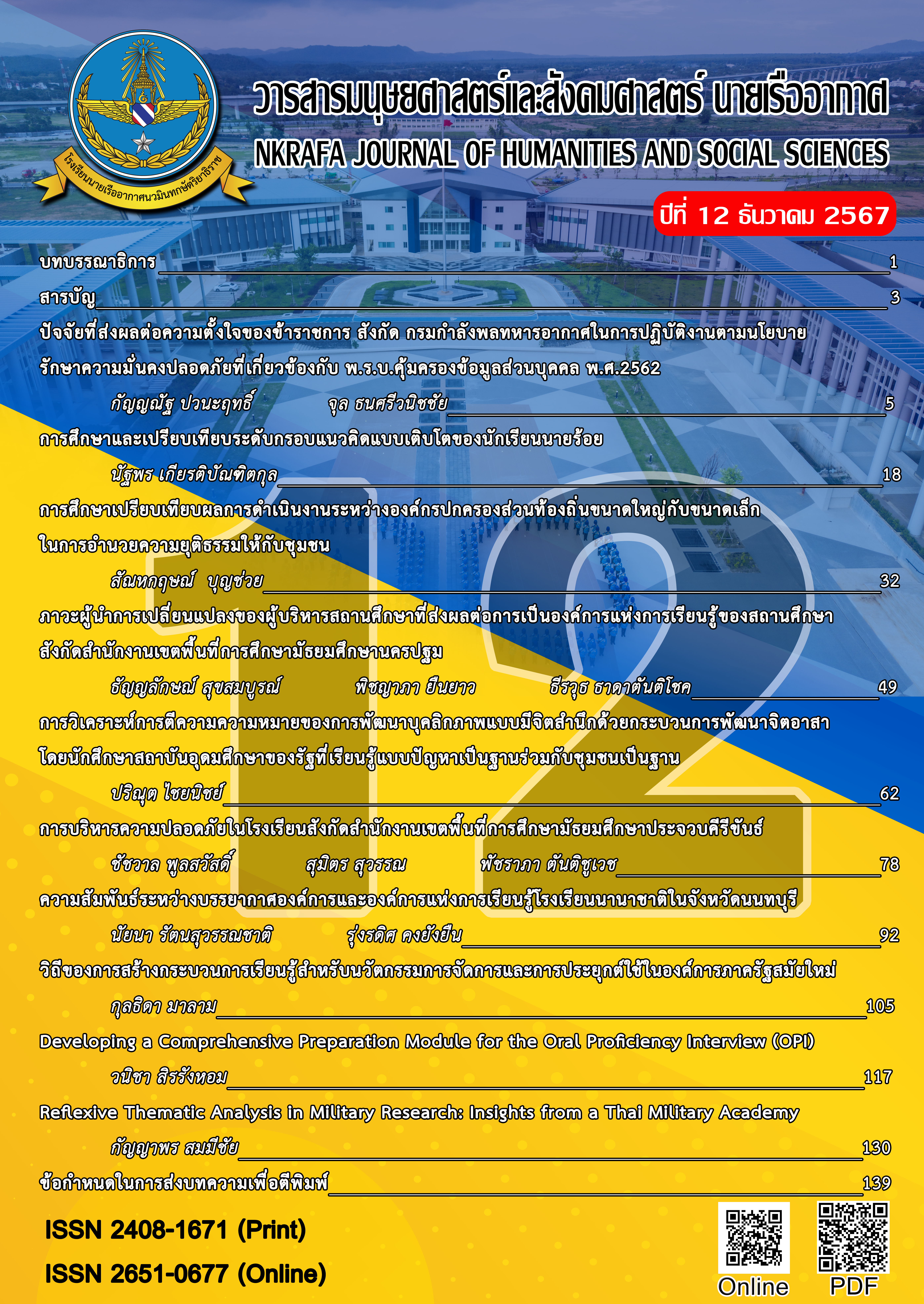The Relationship Between Organizational Climate and Learning Organization of International Schools in Nonthaburi Province
Main Article Content
Abstract
This research aimed to study 1) the organizational climate factors of international schools in Nonthaburi Province, 2) the learning organization factors of international schools in Nonthaburi Province, and 3) the relationship between the organizational climate factors and the learning organization factors of international schools in Nonthaburi Province. The population used in this study was 452 personnel in international schools in Nonthaburi Province. The sample size was calculated using Yamane Taro's formula with a margin of error of 5 percent, resulting in a sample of 212 persons. Non-probability sampling was used, using convenience sampling. The questionnaires were collected from a sample of 219 people. Data were analyzed by finding the mean and standard deviation and test the Pearson correlation coefficient at the 0.05 significance level.
The results of the research found that 1) The overall atmosphere of the international school organization in Nonthaburi Province had a high mean (= 4.85, SD. = 0.95) . 2) The overall learning organization of international schools in Nonthaburi Province had a high mean (= 4.81, SD. = 0.81) 3) The organizational climate and learning organization had a statistically significant positive relationship at 0.05 (r = 0.840).
Article Details

This work is licensed under a Creative Commons Attribution-NonCommercial-NoDerivatives 4.0 International License.
บทความที่ได้รับการตีพิมพ์เป็นลิขสิทธิ์ของวารสารมนุษยศาสตร์และสังคมศาสตร์ นายเรืออากาศ
ข้อความที่ปรากฎในบทความแต่ละเรื่องในวารสารวิชาการเล่มนี้ เป็นความคิดเห็นส่วนตัวของผู้เขียนแต่ละท่าน ไม่เกี่ยวข้องกับโรงเรียนนายเรืออากาศฯ และคณาจารย์ท่านอื่น ๆในโรงเรียนนายเรืออากาศฯ แต่อย่างใด ความรับผิดชอบขององค์ประกอบทั้งหมดของบทความแต่ละเรื่องเป็นของผู้เขียนแต่ละท่าน หากมีความผิดพลาดใด ๆ ผู้เขียนแต่ละท่านจะรับผิดชอบบทความของตนเองแต่เพียงผู้เดียว
References
ณัฐพร ชำนิประศาสน์ (2563). การจัดการความรู้และบรรยากาศองค์การที่ส่งผลต่อการเรียนรู้ในสถาบันการศึกษาเอกชน. วารสารวิจัยบริหารการศึกษา ฉบับที่ 17(2), หน้า 44-58
ทัศนา สุขเปี่ยม, เทอดศักดิ์ ไม้เท้าทอง และศุมรรษตรา แสนวา (2557). ความสัมพันธ์ระหว่างบรรยากาศองค์การกับการเป็นองค์การแห่งการเรียนรู้ของห้องสมุดสถาบันอุดมศึกษาของรัฐตามการรับรู้ของบรรณารักษ์. วารสารบรรณารักษศาสตร์และสารสนเทศศาสตร์, 6(2). สืบค้นจาก https://ejournals.swu.ac.th/index.php/jlis/article/view/4094
รุ่งรดิศ คงยั่งยืน และ สมนึก เพรชช่วย. (2561). ความสัมพันธ์และอิทธิพลระหว่างการแบ่งปันความรู้ บรรยากาศองค์การ องค์การแห่งการเรียนรู้ และความคิดสร้างสรรค์ของครูในสังกัดสำนักงานคณะกรรมการการศึกษาขั้นพื้นฐาน กระทรวงศึกษาธิการ. วารสารร่มพฤกษ์ มนุษยศาสตร์และสังคมศาสตร์, 36(3), 135–158.
Brennan, J., & colleagues. (2019). Organizational climate: New approaches and considerations. Journal of Educational Administration.
Brown, L., & Lee, M. (2020). Leadership's impact on fostering a learning culture in modern enterprises. International Journal of Management Studies, 22(4), 112-130.
Cohen, J. (1988). Statistical power analysis for the behavioral sciences (2nd ed.). Routledge.
Cronbach, Lee J. 1951. “ Coefficient Alpha and The Internal Structure of Tests. Psychometrika. 16(1951) : 297 – 334.
Eren, E. (2015). Educational leadership and organizational learning. Journal of Educational Innovation.
Hoy, W. K., & Miskel, C. G. (2013). Educational administration: Theory, research, and practice. McGraw-Hill.
Hoy, W. K., & Smith, P. A. (2020). Organizational climate and learning: School improvement through leadership. Journal of Educational Management.
Johnson, P. (2019). Organizational adaptability and long-term success in dynamic environments. Business Strategy Review, 30(2), 89-105.
Kahn, W. A. (2018). Psychological conditions of personal engagement and disengagement at work. Academy of Management Journal, 33(4), 692-724.
Kuenzi, M., & Schminke, M. (2020). Understanding the impact of organizational climate on work performance. Organizational Behavior and Human Decision Processes.
Lawler, E. E. (2014). High-involvement management: Participative strategies for improving organizational performance. Jossey-Bass.
Likert, R. (1932). A technique for the measurement of attitudes. Archives of Psychology, 22(140), 1–55.
Locke, E. A., & Latham, G. P. (2019). Goal setting theory: Theory building through practical application. Organizational Behavior and Human Decision Processes, 50(2), 212-247.
Marsick, V. J., & Watkins, K. E. (2018). Theory and practice of the learning organization. Journal of Educational Development.
Meyer, J. P., & Maltin, E. R. (2010). Employee commitment and well-being: A critical review, theoretical framework and research agenda. Journal of Vocational Behavior, 77(2), 323-337.
Moran, T. (2017). The dynamics of trust and school climate. International Journal of Educational Studies.
Reyes, P., & Anderson, G. (2021). Enhancing educational environments through effective leadership and climate management. Educational Management Quarterly.
Rovinelli, R. J., & Hambleton, R. K. (1977). On the use of content specialists in the assessment of criterion-referenced test item validity. Dutch Journal of Educational Research, 2(2), 49–60.
Senge, P. M. (1990). The fifth discipline: The art and practice of the learning organization.
Schneider, B., Ehrhart, M. G., & Macey, W. H. (2017). Organizational climate and culture: Reflections on the past and insights for the future. Annual Review of Organizational Psychology and Organizational Behavior.
Smith, J., & Nguyen, T. (2018). Developing lifelong learning capabilities in organizations. Journal of Organizational Learning, 15(3), 45-60.
Stringer, R. A. (2002). Organizations: Behavior, structure, processes (12th ed.). McGraw-Hill.
Watkins, K. E., & Kim, H. (2022). Learning organizations and school leadership: A contemporary perspective. Educational Management.
Watkins, K. E., & Marsick, V. J. (2019). Creating a learning organization: The role of leadership in building and sustaining a learning culture. International Journal of Training and Development, 23(4), 315-330.
Watkins, K. E., & Marsick, V. J. (2017). Creating the learning organization: A new role for human resource developers in the modern era. XYZ Publishing.
Watkins, K. E., & Marsick, V. J. (1993). Sculpting the learning organization: Lessons in the art and science of systematic change. Jossey-Bass.
Yamane, T. (1967). Statistics: An introductory analysis (2nd ed.). Harper & Row.


